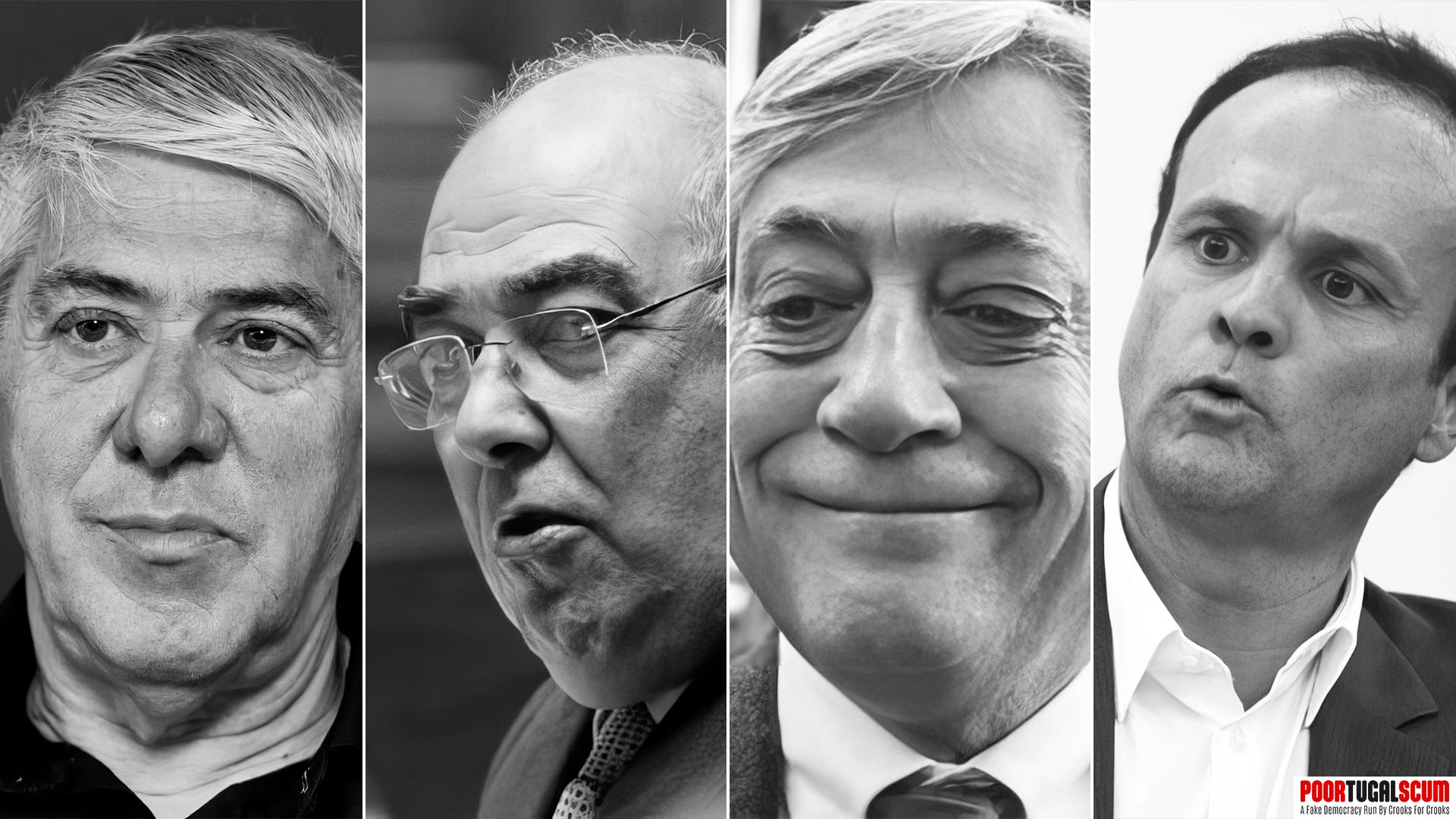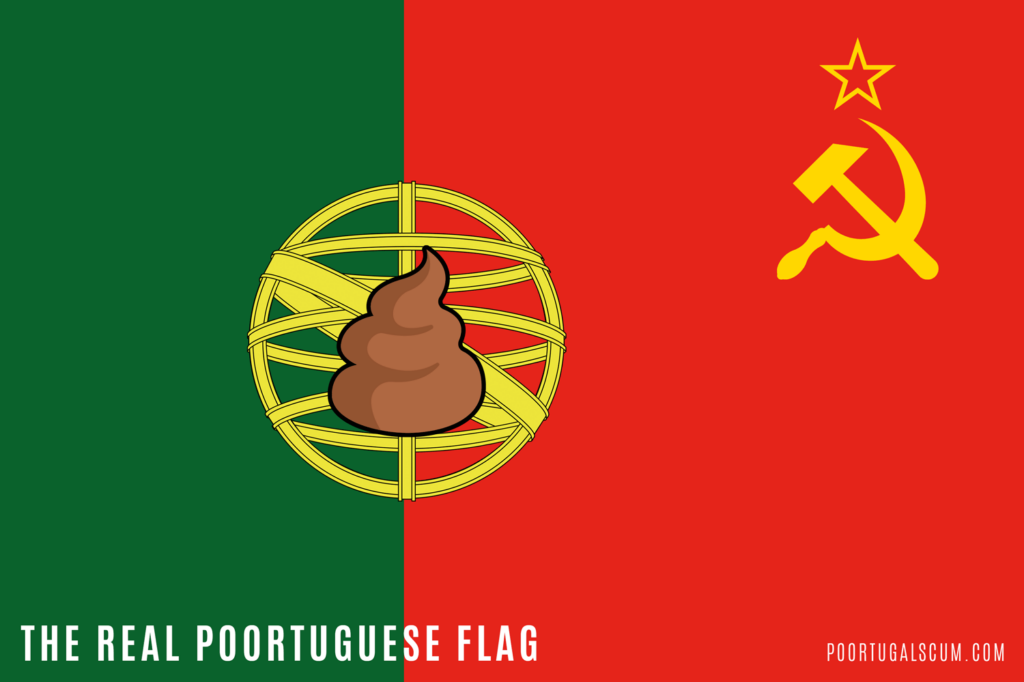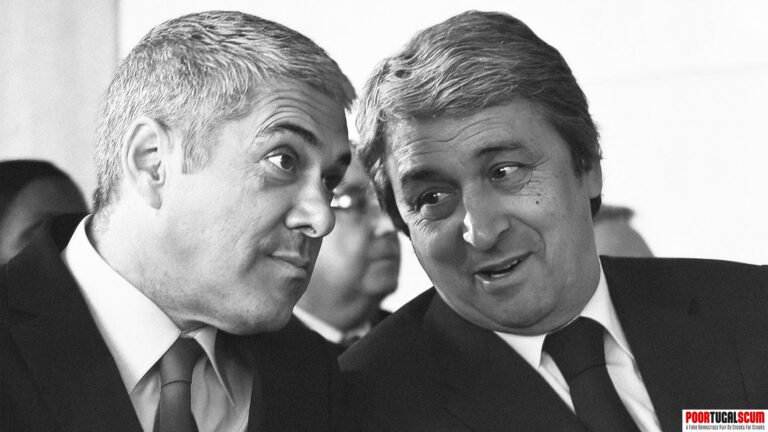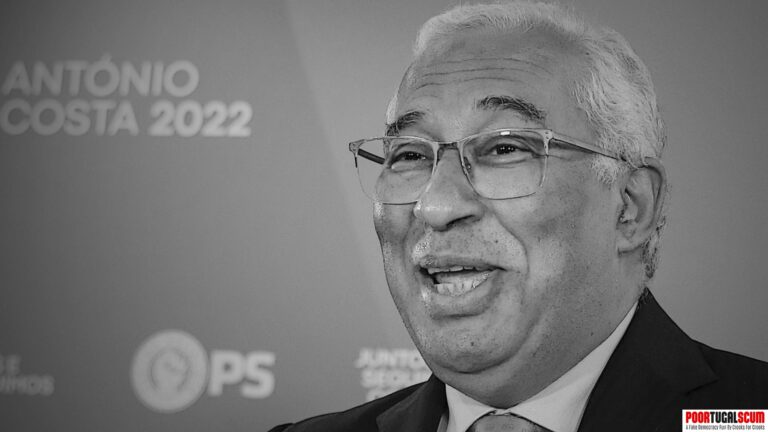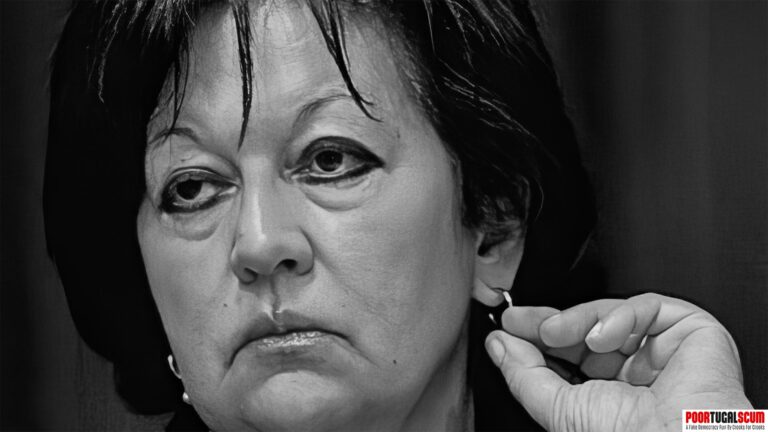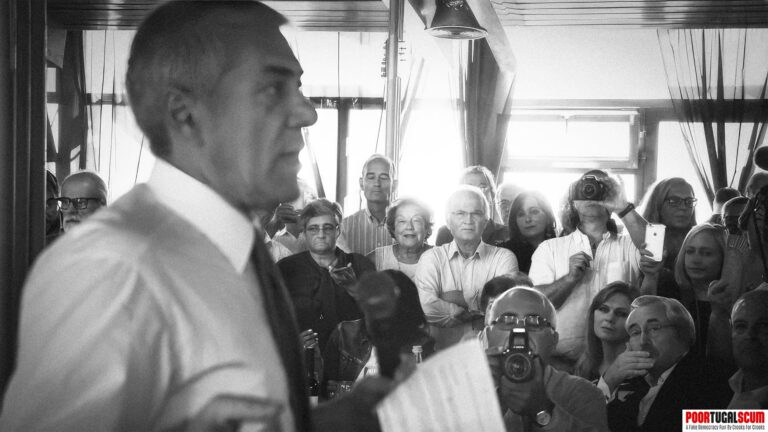The title of this article tells a “la palice” truth, but for the Portuguese it is not like that, and that is why this criminal (an understatement) and his countless cronies have led Portugal into bankruptcy, the consequences of which are being felt today and for many decades to come by future generations, condemning the lives of generations to impoverishment, not only not arrested, but acquitted of all relevant charges, and still very much loved or at least appreciated by the Portuguese population in general. (!!!)
In these PPP “negotiations”, the Portuguese state is paying 18 billion euros for 5.5 billion euros worth of work. The highway sections have been contracted to PPP at 160,000 euros/year per kilometer, while the public company Estradas de Portugal could do exactly the same work for only 3,000 euros/kilometer. (!!!)
Poor things, the Portuguese state was distracted, of course, it’s not their fault! (sarc.)
As for the result of the Portuguese judicial investigations, which lasted ELEVEN years, the Public Ministry “allowed” to prescribe charges and the former rulers do not go to court, as always! Don’t worry, because Portugal is a rule of law state and a democracy! (sarc.)
When will the world wake up and start kicking Portugal out of the international organizations! Mind you, that when it comes to democracy and human rights, Portugal is no different from Cuba or China!
The following article is a translation (mostly MT). You can find the link to the original website at the end of it.
The former presidential candidate and leader of the Frente Cívica association has no doubts about the illegalities committed in the PPP process, and it remains to “find out who was responsible”.
Paulo Morais, one of the promoters of the Frente Cívica association and former presidential candidate,
considers that the illegalities in the process of public-private partnerships (PPP) on roads are “clear”,
and it remains to be seen exactly who promoted them.
According to “Sábado” magazine, former ministers Mário Lino and António Mendonça and former Secretary of State Paulo Campos are targeted in the investigation and were under wiretapping and Sérgio Azevedo recalls that the final report of the commission of inquiry already indicated for worrying signs.
The magazine says that 11 public-private partnerships are at stake regarding the construction and concession of the operation of motorways, from the north to the south of the country.
Do you believe that the ongoing investigation could involve, in court, senior political and government officials?
On this matter, there is no doubt: Sócrates’ governance, in relation to the road PPP processes, was a governance marked by corruption. For several reasons. Firstly, PPPs are ruinous, as everyone says.
People from all parties and quarters have considered the PPPs to be ruinous and they are ruinous because, from the outset,
the contracts signed gave the concessionaires income with internal rates of profitability in the order of 14/15/16 percent. It is obscene that the Portuguese State signs contracts with private individuals guaranteeing them profitability rates of this magnitude.
It is clear that contracts that are so harmful to the State can only be signed by the State either if State bodies are completely incompetent and crazy or, alternatively, if they are corrupt.
But is this profitability rate, in itself, illegal?
It is not illegal, but there are clearly signs of crimes – which prosecutors will have to investigate – of malfeasance, insofar as someone in the State uses a place, a mandate entrusted by the people for private benefit. But, in addition to this, every year there were also,
in addition to these profitability rates, compensatory compensation to dealers, which, in turn, also amounted to hundreds of millions of euros. In other words, under a mechanism pompously called “financial rebalancing agreements”, the State granted hundreds of thousands of euros more to private individuals.
Now, at the time of Socrates’ governments, these contracts were signed and, as no one knew the size of the payments, this could not be reflected in the Budgets of subsequent years.
And this goes until 2035, 2036. At the time, no one knew what responsibilities the State would have.
PPPs are ruinous because the rents are obscene and allow huge profitability rates for private concessionaires. Furthermore, compensation worth billions is given over the years.
In addition to all this, they are illegal, because they have confidential annexes, they do not comply with the budgetary framework law, they do not have a public buyer as the law requires.
Obviously, the illegalities of this process are immense and, fortunately, it seems that defendants will finally be named, with the charges that, naturally, the Public Prosecutor’s Office understands. But it is essential that there are fair trials, that there is no redundancy, and that the economic crime that PPPs constituted and that they represent, even today, for Portuguese public finances is understood.
We are still talking about suspicions and, finally, the strong signs that you just described…
Let me tell you: these are not clues, these are illegalities.
It is not clear who is responsible, who is to blame. It is necessary to determine who was primarily responsible for these illegalities,
which are objective and which were committed during the governance of engineer Sócrates.
Given the illegalities you described, is the need to immediately put an end to road PPPs reinforced?
Naturally. There is a Portuguese proverb that says that “what is born crooked later or never becomes straight” and, in fact, road PPPs no longer have any other solution than the definitive termination of contracts, because the consequences of these bad deals made more than ten years are still reflected today.
Today, in 2018, road PPPs are valued at 5.5 billion euros and the contracts foresee that the Portuguese State will pay, for 5.5 billion, 18 billion. This is, of course, inconceivable.
What is the way to resolve this problem? Terminate public-private partnership contracts, with the contracts naturally being handed over to the State and the concessionaires being compensated for the fair value of the assets at the moment the law comes into force.
More related news
Weight of national PPPs in GDP is 10.8%, the highest in the European Union
Portugal is the country with the highest number of public-private partnerships, five times more than the European average. The overall expenditure is estimated at 20 billion euros, and two thirds of what was contracted still remains to be paid
Portugal is the most burdened country in the European Union (EU) with the costs of public-private partnerships (PPP). The commitments made to private parties are equivalent to 10.8% of the national gross domestic product (GDP at 2017 prices). There are around 20 billion euros that will have to be paid by 2042. In total, there are 43 partnerships.
Of the amount assumed as investment, two thirds still remain to be reimbursed to private partners: 12.4 billion euros. The amount was higher, but in the meantime the PSD-CDS and PS governments renegotiated some contracts (ten road partnerships, for example), which made it possible to slightly ease the burden on taxpayers. The overwhelming majority of PPPs are roads (93% of the expected cost).
Even so, those 10.8% of GDP, calculated by DN/Dinheiro Vivo based on figures provided by the European Court of Auditors (TCE) and the European Investment Bank (EIB), and on the European Commission’s GDP estimates, represent, by far, the biggest relative burden in Europe. The second largest occurs in Greece, where the weight of PPP is around 8%. The third largest is the United Kingdom (6.8%). The European average is five times lower than the national average: 2%.
According to several experts, the PPP model allows the State (governments) to move forward with large projects for which there is no immediate financial availability, neither public nor private. In the case of Portugal, PPPs made it possible to inject enormous volumes of investment, which have to be paid in installments over decades to private concessionaires.
In a study released last week by the TCE, it is explained that “the main difference between PPPs and traditional projects is the sharing of risks between the public and private partners. The risks of a PPP project must be attributed to the most capable party to manage them, with the aim of achieving the ideal balance between the transfer of risks and the compensation attributed to the party assuming the risks”.
Thus, “the private partner is often responsible for the risks associated with the design, construction, financing, operation and maintenance of infrastructure, while the public partner normally assumes the regulatory and political risks”.
Until a few years ago, there was a problem of bias, which meant that the public partner was too exposed to design, construction, maintenance or operational risks. This is what led to the renegotiation of several contracts. (addendum from the blog author: which only covered 4% to 10% of the disastrous contracts for Portuguese taxpayers)
PPP charges are paid every year through the State Budget (OE) and take the form of intermediate consumption or social benefits (in the case of hospitals). In 2018, the bill is almost 1.7 billion euros, the government predicts in the Budget.
The TCE also raises doubts about the correct or most effective use of the model. The institution, citing figures from the EIB’s European PPP Specialization Center, says that from 1990 to 2016, 1,749 PPPs were made in Europe, worth 336 billion euros. The TCE recalls that, “before the financial crisis, the PPP market was registering a strong increase in volume, but from 2008 onwards the number of new projects decreased considerably”.
This was not the case in Portugal. Between 2008 and 2010, the PS government, led by José Sócrates, invested heavily in the model, despite the threats on the horizon.
It advanced with 9.3 billion euros in 19 new PPPs, 45% of the total value contracted since 1995. The maximum occurred in 2008; the second highest value in 2010,
with the country on the brink of bankruptcy.
( … )
More related news
“State pays 1,200 million euros more”. Paulo Morais defends renegotiation of road PPP
When the Prime Minister said, at Renascença, that he will not pay compensation to road concessionaires, he is talking about the minority and not about the 21 existing public-private partnerships (PPP), explains Paulo Morais.
The Portuguese State pays “1,200 million more” annually for public-private partnerships (PPP) on roads and the current crisis should serve as a basis for renegotiation, argues Professor Paulo Morais, specialist in good public governance, from the Transparency and Integrity association at Renascença.
( … )
In 90% of cases, the Portuguese State will continue to pay the amount already granted, even without receiving any benefit, he emphasizes.
The 1,500 million euros planned for this year for road PPPs will have to be paid and only Brisa concessionaires, in much smaller numbers, will see a drop in income, in these months of pandemic.
Even so, according to Paulo Morais, it is not serious that these concessionaires ask for any compensation and he explains why.
“One aspect is the concessions in the most varied areas, here we are talking about motorways, such as the A1, between Porto and Lisbon, I think there is no reason for there to be any compensation to the concessionaires. Traffic has dropped brutally, but the concession contracts are for decades and if, eventually, for two or three months there is a decrease in traffic, this must be understood as a natural business risk.”
A different matter, argues Paulo Morais, are the highways in public-private partnership, “in which there should be a brutal reduction in what the State is paying for rent”.
“If there is no traffic at the moment, it is clear that what is being paid to the road PPP concessionaires should not be paid.
Therefore, I believe that not only is there no place for compensation from traditional concessionaires, as is the case of the Porto-Lisbon motorway, but payments to road PPPs should also cease, at least on the scale in which it is currently taking place.”, argues the professor.
“These are very painful contracts for the Portuguese State and I think it would be time for the State to reformulate them and start paying much less for the value of the concessions.
The Portuguese State is currently paying 1,500 million euros for road PPPs in 2020 for an asset that is valued at around 6 billion euros. Given this value, the State should be paying between 340 and 350 million euros. If you are paying 1,200 million euros more, that doesn’t make sense under any circumstances, much less in the crisis situation we are currently experiencing”, he highlights.
More related news
The state company Estradas de Portugal charges 53 times less than private PPP companies
The Secretary of State for Transport admitted this Monday that
the maintenance of roads in the Baixo Tejo public-private partnership was contracted at 160,000 euros/year per kilometer and that Estradas de Portugal does the same work for 3,000 euros.
According to Sérgio Monteiro, the Baixo Tejo case was the “most expensive” he found in the renegotiation of public-private partnerships.
This sub-concession for the district of Setúbal “had a road maintenance cost of 160,000 euros per kilometer in the coming years and Estradas de Portugal has foreseen in its budget maintenance interventions that do not exceed 3,000 euros per kilometer/year”, Sérgio Monteiro told Lusa agency.
“When we transfer the maintenance cost to our side, we do so taking into account the information that Estradas de Portugal has available”, added the Secretary of State for Transport, ensuring that the maintenance work in question was strictly the same.
According to the government official, “whoever made the previous decisions has to answer for them”.
More related news
Public Ministry allows crimes to be prescribed and former rulers do not go to court
Mário Lino, Teixeira dos Santos and António Mendonça can no longer be held responsible for corruption or abuse of power. Defendants were CONSTITUTED TOO LATE.
The Public Ministry allowed crimes to be prescribed that may have been committed by former government officials during the negotiation of public-private partnerships for the construction of highways.
Jornal Público reports that the Public Prosecutor’s Office’s delay in the process explains the accusations against three of the ten defendants in the case.
Thus, Mário Lino, Teixeira dos Santos and António Mendonça can no longer be held responsible for crimes of corruption or abuse of power because THEY WERE ACCUSED TOO LATE.
The expectations of the Public Prosecutor’s Office were high, it even spoke of active and passive corruption, criminal association, money laundering, influence peddling, aggravated tax fraud and harmful administration.
The truth is that the entire process was left with nothing but the accusation of economic participation in a business, now attributed to Carlos Costa Pina, Paulo Campos and a former administrator of Estradas de Portugal, Rui Manteigas.
The investigation into the negotiations of public-private partnerships began 11 years ago.
At issue is the way in which the concession contracts signed with Ascendi were changed.
For DCIAP, cited by Público, the renegotiations purposefully harmed the public interest, by making Estradas de Portugal and the State assume responsibility for net payments of fixed and certain amounts (contingent compensations) that were not foreseen in the base proposals presented at the beginning of the concession competition.
( … )
The Public Ministry brought charges against Paulo Campos and Carlos Costa Pina, respectively former Secretaries of State for Public Works and the Treasury of the Government of José Sócrates, in the case of Public-Private Road Partnerships.
Paulo Campos is accused of 10 crimes of economic participation in business for the alleged benefit of several road concessionaires in the negotiation of sub-concessions and the renegotiation of several freeway contracts at no cost to the user (SCUT).
The alleged benefit exceeds one billion euros.
Carlos Costa Pina, currently executive director of Galp, is accused of five crimes of economic participation co-authored with Paulo Campos.
The suspicions that fell on former ministers Mário Lino, António Mendonça and Teixeira dos Santos were shelved, who were accused, but ended up not being charged.

